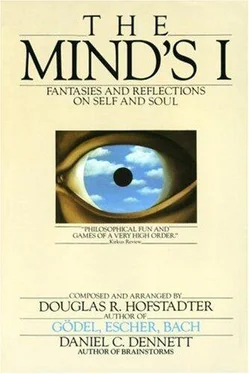ACHILLES: Oh, really? You mean that my two “modes” may have some more general type of applicability, in situations other than fugue-listening?
ANTEATER: Absolutely.
ACHILLES: I wonder how that could be. I guess it has to do with alternating between perceiving something as a whole and perceiving it as a collection of parts. But the only place I have ever run into that dichotomy is in listening to fugues.
TORTOISE: Oh, my, look at this! I just turned the page while following the music, and came across this magnificent illustration facing the first page of the fugue.
CRAB: I have never seen that illustration before. Why don’t you pass it ’round?
(The Tortoise passes the book around. Each of the foursome looks at it in a characteristic way—this one from afar, that one from close up, everyone tipping his head this way and that in puzzlement. Finally it has made the rounds and returns to the Tortoise, who peers at it rather intently. )
ACHILLES: Well, I guess the prelude is just about over. I wonder if, as I listen to this fugue, I will gain any more insight into the question “What is the right way to listen to a fugue: as a whole, or as the sum of its parts?”
TORTOISE: Listen carefully, and you will!
(The prelude ends. There is a moment of silence; and …
[ATTACCA ]
…Ant Fugue
…then, one by one, the four voices of the fugue chime in.)
ACHILLES: I know the rest of you won’t believe this, but the answer to the question is staring us all in the face, hidden in the picture. It is simply one word—but what an important one: “MU”!
CRAB: I know the rest of you won’t believe this, but the answer to the question is staring us all in the face, hidden in the picture. It is simply one word—but what an important one: “HOLISM”!
ACHILLES: Now hold on a minute. You must be seeing things. It’s plain as day that the message of this picture is “MU,” not “HOLISM”!
CRAB: I beg your pardon, but my eyesight is extremely good. Please look again, and then tell me if the picture doesn’t say what I said it says!
ANTEATER: I know the rest of you won’t believe this, but the answer to the question is staring us all in the face, hidden in the picture. It is simply one word—but what an important one: “REDUCTIONISM”!

CRAB: Now hold on a minute. You must be seeing things. It’s plain as day that the message of this picture is “HOLISM,” not “REDUCTIONISM”!
ACHILLES: Another deluded one! Not “HOLISM,” not “REDUCTIONISM,” but “MU” is the message of this picture, and that much is certain.
ANTEATER: I beg your pardon, but my eyesight is extremely clear. Please look again, and then see if the picture doesn’t say what I said it says.
ACHILLES: Don’t you see that the picture is composed of two pieces, and that each of them is a single letter?
CRAB: You are right about the two pieces, but you are wrong in your identification of what they are. The piece on the left is entirely composed of three copies of one word: “HOLISM”; and the piece on the right is composed of many copies, in smaller letters, of the same word. Why the letters are of different sizes in the two parts, I don’t know, but I know what I see, and what I see is “HOLISM,” plain as day. How you see anything else is beyond me.
ANTEATER: You are right about the two pieces, but you are wrong in your identification of what they are. The piece on the left is entirely composed of many copies of one word: “REDUCTIONISM”; and the piece on the right is composed of one single copy, in larger letters, of the same word. Why the letters are of different sizes in the two parts, I don’t know, but I know what I see, and what I see is “REDUCTIONISM,” plain as day. How you see anything else is beyond me.
ACHILLES: I know what is going on here. Each of you has seen letters which compose, or are composed of, other letters. In the left-hand piece, there are indeed three “HOLISM”s, but each one of them is composed out of smaller copies of the word “REDUCTIONISM.” And in complementary fashion, in the right-hand piece, there is indeed one “REDUCTIONISM,” but it is composed out of smaller copies of the word “HOLISM.” Now this is all fine and good, but in your silly squabble, the two of you have actually missed the forest for the trees. You see, what good is it to argue about whether “HOLISM” or “REDUCTIONISM” is right, when the proper way to understand the matter is to transcend the question, by answering “MU”?
CRAB: I now see the picture as you have described it, Achilles, but I have no idea of what you mean by the strange expression “transcending the question.”
ANTEATER: I now see the picture as you have described it, Achilles, but I have no idea of what you mean by the strange expression “mu.”
ACHILLES: I will be glad to indulge both of you, if you will first oblige me, by telling me the meaning of these strange expressions, “holism” and “reductionism.”
CRAB: Holism is the most natural thing in the world to grasp. It’s simply the belief that “the whole is greater than the sum of its parts.” No one in his right mind could reject holism.
ANTEATER: Reductionism is the most natural thing in the world to grasp. It’s simply the belief that “a whole can be understood completely if you understand its parts, and the nature of their ‘sum.’ ” No one in her left brain could reject reductionism.
CRAB: I reject reductionism. I challenge you to tell me, for instance, how to understand a brain reductionistically. Any reductionistic explanation of a brain will inevitably fall far short of explaining where the consciousness experienced by a brain arises from.
ANTEATER: I reject holism. I challenge you to tell me, for instance, how a holistic description of an ant colony sheds any more light on it than is shed by a description of the ants inside it, and their roles, and their, interrelationships. Any holistic explanation of an ant colony will inevitably fall far short of explaining where the consciousness experienced by an ant colony arises from.
ACHILLES: Oh, no! The last thing that I wanted to do was to provoke another argument. Anyway, now that I understand the controversy, I believe that my explanation of “mu” will help greatly. You see “mu” is an ancient Zen answer which, when given to a question, unasks the question. Here, the question seems to be “Should the world be understood via holism or via reductionism?” And the answer of “mu” here rejects the premises of the question, which are that one or the other must be chosen. By unasking the question, it reveals a wider truth: that there is a larger context into which both holistic and reductionistic explanations fit.
ANTEATER: Absurd! Your “mu” is as silly as a cow’s moo. I’ll have none of this Zen wishy-washiness.
CRAB: Ridiculous! Your “mu” is as silly as a kitten’s mew. I’ll have none of this Zen washy-wishiness.
ACHILLES: Oh, dear! We’re getting nowhere fast. Why have you stayed so strangely silent, Mr. Tortoise? It makes me very uneasy. Surely you must somehow be capable of helping straighten out this mess?
TORTOISE: I know the rest of you won’t believe this, but the answer to the question is staring us all in the face, hidden in the picture. It is simply one word—but what an important one: “MU”!
(Just as he says this, the fourth voice in the fugue being played enters, exactly one octave below the first entry.)
Читать дальше












